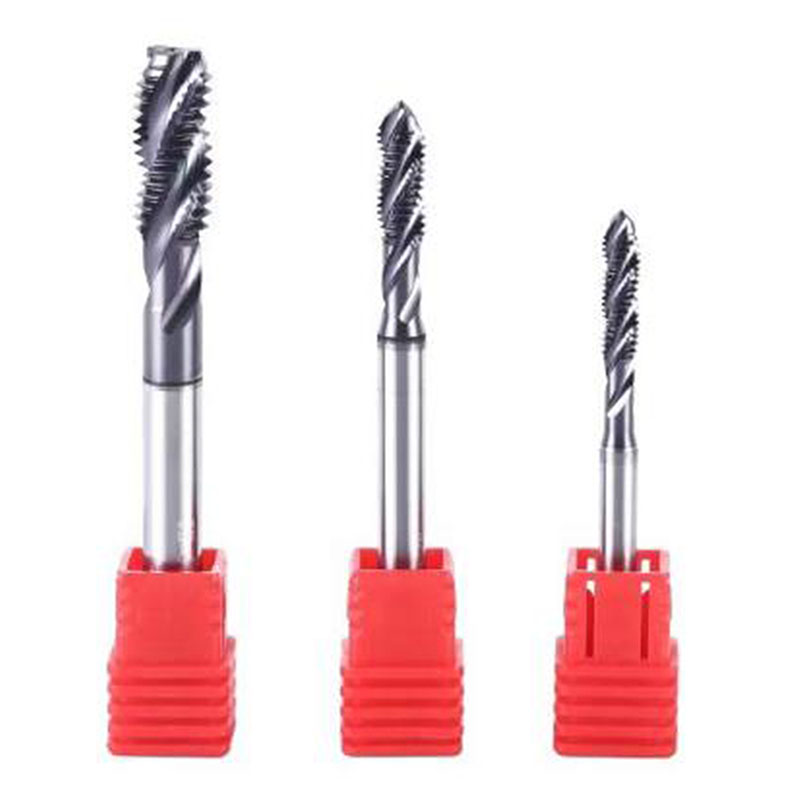Carbide Tap: A Superior Tool for Precision Threading
2025-05-12
In the world of machining and metalworking, the ability to create precise threads is essential for producing quality components. Whether for manufacturing, automotive, aerospace, or construction industries, threading plays a crucial role in ensuring the integrity and functionality of mechanical assemblies. To achieve optimal results in threading, the use of high-quality tools is necessary. One such tool that stands out in the world of precision machining is the carbide tap.

What is a Carbide Tap?
A carbide tap is a specialized tool used for cutting internal threads (or tapping) into a material. Unlike standard taps made from high-speed steel (HSS), carbide taps are made from a much harder material – tungsten carbide. This makes carbide taps highly durable, able to withstand high levels of heat, pressure, and wear, offering superior performance in demanding machining processes.
Carbide taps are primarily used when threading materials that are tough, heat-resistant, or abrasive, such as stainless steel, titanium, high-strength alloys, or hardened materials. They are also employed in industries where precision and durability are essential.
Key Features of Carbide Taps
1. High Hardness and Durability:
The primary feature that sets carbide taps apart is their exceptional hardness. Tungsten carbide, the material from which these taps are made, is one of the hardest substances available for machining tools. This makes carbide taps ideal for cutting tough materials that would otherwise wear down standard taps quickly.
2. Heat Resistance:
Carbide taps can endure extreme temperatures generated during the tapping process. This heat resistance allows them to maintain their sharp cutting edges even in high-speed operations, which are often encountered when working with heat-treated or tough materials. The ability to withstand heat also improves their performance and extends their lifespan.
3. Precision and Accuracy:
Carbide taps provide excellent precision and accuracy when cutting threads. Their ability to maintain sharp edges throughout the tapping process ensures clean and consistent threads with minimal burr formation. This feature is crucial for applications that require tight tolerances and high-quality finishes.
4. Increased Cutting Speed:
Due to their high rigidity and resistance to wear, carbide taps allow for faster cutting speeds compared to HSS taps. This can improve productivity in a manufacturing setting, enabling more parts to be produced in less time.
5. Enhanced Surface Finish:
Carbide taps produce smoother threads with superior surface finishes. The high hardness of carbide allows for precise cuts with minimal tool wear, leading to clean, well-defined threads that contribute to the overall quality of the finished product.
6. Longer Tool Life:
Thanks to their wear resistance, carbide taps generally have a longer tool life than their HSS counterparts. This means fewer tool changes, reduced downtime, and lower overall operating costs in machining operations.
Applications of Carbide Taps
1. Aerospace and Automotive Industries:
In industries such as aerospace and automotive manufacturing, the ability to produce precise and durable threads is critical. Carbide taps are used to create threads for components like engine parts, transmission systems, and structural elements that require high strength and resistance to wear and heat.
2. Medical Device Manufacturing:
The medical industry requires components with exacting specifications and high integrity. Carbide taps are ideal for manufacturing parts such as surgical instruments, implants, and other precision equipment, where thread quality is crucial for functionality and safety.
3. Oil and Gas Industry:
The oil and gas industry often uses carbide taps to create threads in high-strength materials such as alloys and metals that are resistant to corrosion, pressure, and heat. Carbide taps provide the durability and precision needed for these demanding environments.
4. Tooling and Machining:
Carbide taps are widely used in general machining applications, particularly when creating threads in difficult-to-machine materials like stainless steel and titanium. They are also used for high-precision tooling where thread integrity and quality are critical.
5. Electronics and Equipment Manufacturing:
In the electronics sector, carbide taps are used to create threads for mounting holes and fastening components in electronic devices and equipment. Their ability to cut clean and precise threads ensures secure fittings and proper assembly of electronic parts.
Advantages of Using Carbide Taps
1. Enhanced Productivity:
Carbide taps enable faster cutting speeds without compromising on thread quality. This leads to higher production rates and more efficient machining processes, which is particularly beneficial in high-volume manufacturing environments.
2. Cost-Effectiveness in the Long Run:
While carbide taps may have a higher initial cost compared to HSS taps, their longer lifespan, durability, and ability to withstand high cutting speeds make them a cost-effective solution over time. Fewer tool changes and less downtime mean reduced overall operational costs.
3. Superior Thread Quality:
The ability of carbide taps to create threads with smooth finishes and minimal burrs enhances the quality of the final product. This is especially important in industries where thread performance is critical for assembly, functionality, and durability.
4. Resistance to Abrasive Materials:
Carbide taps are well-suited for cutting threads in abrasive materials that would wear down standard taps quickly. This makes them invaluable for applications in industries that work with tough metals and composites.
Challenges of Using Carbide Taps
1. Brittleness:
One of the drawbacks of carbide taps is their brittleness. While they are highly resistant to wear, they can be more susceptible to breaking or chipping under shock or excessive force. Proper care and handling during use are essential to prevent damage to the tool.
2. Higher Initial Cost:
Carbide taps are typically more expensive than HSS taps due to the cost of the raw material and the manufacturing process. For companies with a limited budget, this higher upfront cost may be a consideration.
3. Specialized Knowledge Required:
Because carbide taps are harder and more rigid, they often require specialized knowledge and expertise to use effectively. Correct selection of cutting speeds, feeds, and lubrication is crucial to maximize their performance and prevent premature wear.
Conclusion
Carbide taps are an essential tool for precision threading in the machining world. Their exceptional hardness, heat resistance, and ability to provide accurate and durable threads make them the go-to solution for manufacturers working with tough, heat-resistant, or abrasive materials. While they may come with a higher initial cost, their longevity, productivity advantages, and ability to produce high-quality threads make them a wise investment for industries that demand precision and performance. From aerospace and automotive to medical device manufacturing, carbide taps offer the reliability and precision needed to meet the rigorous demands of modern production.


